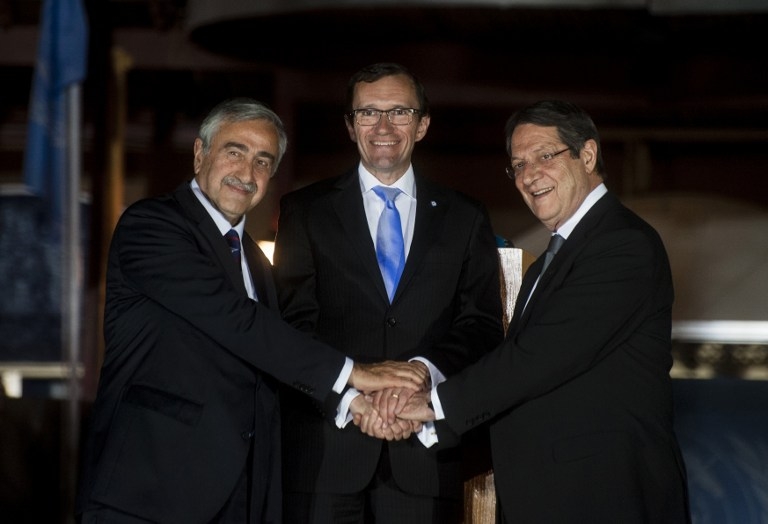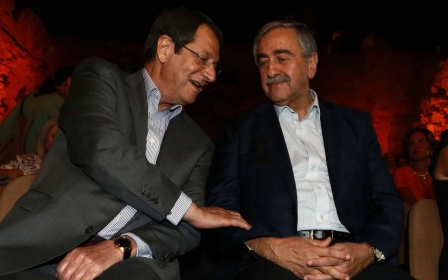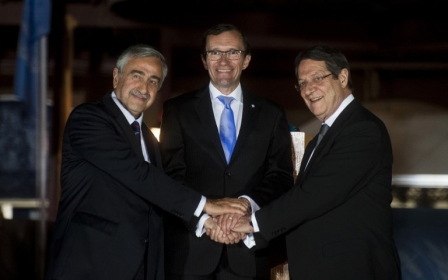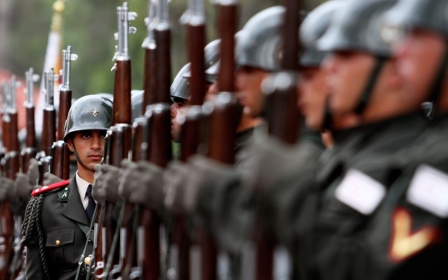Cyprus peace talks try to break decades-old deadlock

Rival Cypriot leaders resumed UN-brokered peace talks in Geneva on Monday billed as a historic opportunity to end decades of conflict on the divided island, but the outcome is far from certain.
Turkish Cypriot leader Mustafa Akinci and Cypriot President Nicos Anastasiades, who have negotiated for more than 18 months in the run-up to the talks, arrived separately at UN headquarters in Geneva before sitting down for talks.
The two leaders, who have been among the most outspoken proponents of a deal, smiled at the cameras before settling around a large table with their extensive delegations and delving into the thorny talks.
'It is a real possibility that 2017 will be the year when the Cypriots, themselves, freely decide to turn the page of history'
- Espen Barth Eide, UN envoy
The two sides are set to meet for three days in Geneva, and should on Wednesday provide maps of their proposals for the internal boundaries of a future bi-zonal federation on the eastern Mediterranean island.
If that goes to plan, they will be joined from Thursday by the leaders of the island's three guarantor powers - former colonial ruler Britain, Greece and Turkey.
Cyprus, home to around one million people, has been divided since 1974, when Turkish troops invaded the island in response to an Athens-inspired coup seeking union with Greece.
But both sides acknowledge key issues still need to be thrashed out, with the prospects of solving one of the world's longest-running geopolitical disputes remaining murky.
The United Nations has pulled out all the stops in its bid for a deal, eyeing the best chance of a settlement in more than a decade.
"It is a real possibility that 2017 will be the year when the Cypriots, themselves, freely decide to turn the page of history," said UN envoy Espen Barth Eide, who welcomed the two leaders along with the UN's Geneva chief Michael Moeller.
'Tough week' ahead
But some experts believe the Geneva talks are a disaster waiting to happen because of deep divisions on core issues such as property, territorial adjustments and security.
Leaving for Geneva on Sunday, Akinci described the talks as a "crossroads".
"We are not at a point where Geneva will mark the final conclusion. We need to be cautious," he said. "We are expecting a tough week."
'We are not at a point where Geneva will mark the final conclusion. We need to be cautious'
- Mustafa Akinci, Turkish Cypriot leader
Anastasiades tweeted that he was heading to Geneva "with hope, confidence and unity" after earlier striking a note of caution, warning of "significant differences on substantive issues fundamental to a Cyprus solution".
Nine years later, Turkish Cypriot leaders declared a breakaway state in the north which is recognised only by Ankara.
The years of communal violence, which culminated in the Turkish invasion, saw tens of thousands from both sides flee their homes - and they remain displaced to this day.
Crunch issues
It has always been agreed that some of the territory currently controlled by the Turkish Cypriots will be ceded to Greek Cypriot control in any peace deal.
Just how much and which land they should give up has hampered four decades of talks.
The issue is vital because the two leaders have pledged to put any deal to the vote in their respective communities.
In 2004, a majority of Turkish Cypriots backed a UN reunification plan but it was overwhelmingly rejected by Greek Cypriots.
In 2004, a majority of Turkish Cypriots backed a UN reunification plan but it was overwhelmingly rejected by Greek Cypriots
Cyprus then joined the European Union, although EU legislation is suspended in the north until a settlement is reached.
The sides also remain far apart on how many Greek Cypriots should be able to return to homes they fled in 1974, with Akinci determined to minimise the number of Turkish Cypriots who would be displaced for a second time.
And there are differences over security arrangements, with Anastasiades wanting Turkish troops to leave the island but Akinci determined to keep a military presence.
Akinci also insists on a rotating presidency with a Turkish Cypriot elected every two years - a proposal unpopular among Greek Cypriots.
Middle East Eye propose une couverture et une analyse indépendantes et incomparables du Moyen-Orient, de l’Afrique du Nord et d’autres régions du monde. Pour en savoir plus sur la reprise de ce contenu et les frais qui s’appliquent, veuillez remplir ce formulaire [en anglais]. Pour en savoir plus sur MEE, cliquez ici [en anglais].




